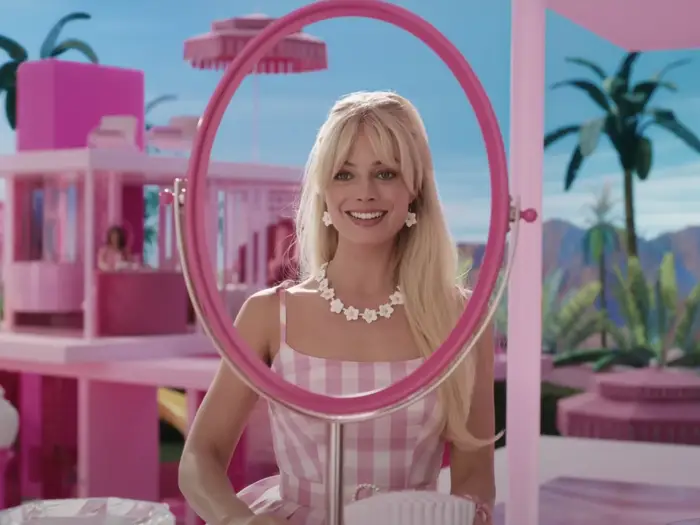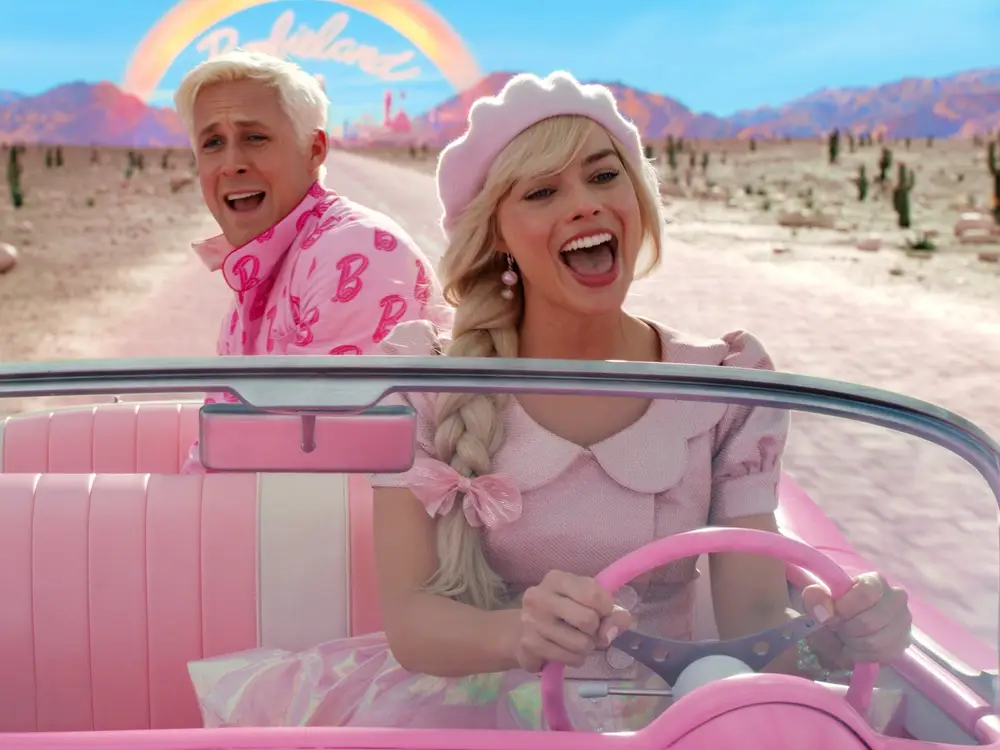Before even catching a glimpse of the trailer, as someone who grew up playing with Barbies, it was evident that adoration for Barbie would ensue. Greta Gerwig’s remarkable direction, Margot Robbie and Ryan Gosling donning neon leotards whilst rollerblading the streets of Los Angeles, and the inclusion of various remixes of the iconic Aqua “Barbie” song—such elements constitute the epitome of a cinematic dream. The astonishing outcome, however, surpassed all expectations, managing to profoundly resonate with the humanity of each individual seated in the theater.
Barbie appeals to audiences for various reasons, such as feminism, nostalgia, visuals, or a combination. A visit to the theater is likely to leave viewers with heightened faith in the world. Let’s dive into six life lessons from Barbie ( warning: bright pink spoilers ahead! ) that will be etched in our memories.
Hey, you know what? Girls can do absolutely anything, and it’s totally okay if you find that incredibly exhausting. Believe me, it’s empowering and worth every bit of effort.
Barbie has always been a symbol of empowerment in BarbieLand. Talented Barbies like physicist Barbie, journalist Barbie, and doctor Barbie have shown the world that girls can do anything. They’ve inspired millions with their achievements. But here’s the thing: being super successful is not all rainbows and unicorns. Gerwig brilliantly captures the struggle of doing and being everything in Barbie’s life.
It all starts with those little moments that hit home. Waking up groggy after a sleepless night, feeling the shock of ice-cold shower water, and accidentally burning your breakfast waffle. We’ve all been there, right? It’s the toll of hustle culture, no matter how inspiring it may be.
Gerwig does something remarkable in this movie. She makes us feel two conflicting emotions at once. On one hand, achieving great things as a woman is incredibly empowering. On the other hand, it’s undeniably exhausting. Barbie’s journey begins with recognizing that she’s exhausted. It’s the first step towards finding her own humanity.
And you know what? We can learn from that too. On those days when we feel both proud and depleted, we can find solace in Barbie’s story. It’s a reminder that it’s okay to acknowledge our exhaustion and take care of ourselves.
So, let’s embrace the highs and lows of being a modern-day Barbie, finding our own balance between empowerment and self-care.

Feminists across different generations can discover shared values and perspectives.
Real women of different generations are portrayed in Barbie, each sharing their own unique perspective on womanhood. Sasha, a teenage girl who initially despises Barbie, represents a contrast to her traditional beauty standards and consumerist symbolism. But Sasha’s mother, Gloria, cherishes memories of playing with Barbies and questions the boundaries Barbie represents through her artwork. Meanwhile, Ruth Handler, the creator of Barbie, envisioned the doll as a source of inspiration for women despite its initial imperfections.
Throughout the movie, Barbie interacts with these women, offering varying perspectives on feminism and womanhood. However, it’s in the final scene, set in BarbieLand, where Sasha, Gloria, and Ruth unite in supporting Barbie. This powerful moment serves as a metaphor for different generations of feminists finding common ground, transcending the divisions imposed by the patriarchy. As Ruth aptly remarks in the film, “We mothers stand still so our daughters can look back and see how far they’ve come.”
Together, these women demonstrate the transformative journey that Barbie undertakes, revealing her true humanity and becoming a source of empowerment.
We all have a job to do when it comes to reminding other women just how powerful they are.
It’s important to note that extremes of masculinity and femininity can be harmful to everyone involved.
Forget about living in a Barbie dream house – personally, I’d pass on both Kendom and Barbieland. I mean, seriously, who wants to be stuck in a world run by men where I’m expected to be a maid and serve my Ken a “brewski”? And let’s not even get started on Barbieland, where the Kens have no purpose other than hitting the beach, and the Barbies are left to do everything. I don’t know about you, but that doesn’t sound appealing to me either.
But you know what Gerwig reveals through these extreme portrayals of masculinity and femininity? That neither is healthy. The real beauty lies in the middle ground, where true humanity and diversity exist for everyone. Of course, the Real World leans more towards Kendom than Barbieland, so it’s high time we invested our efforts, resources, and money into empowering women and promoting their success.
Now, doesn’t that just make you want to take action?
Women don’t need to carry the responsibility of fixing men who are still figuring themselves out.
Let’s get this straight: I am definitely NOT head over heels for Ken! Seriously though, when Barbie straight-up told Ken that he had to find himself without her, I couldn’t help but shed a tear. Instead of keeping up the charade of a lovey-dovey romance between Barbie and Ken, Gerwig made her protagonist put her foot down and establish a crucial boundary: she wasn’t going to fix Ken’s messed-up masculinity. It’s a powerful message, one that resonates in the real world. We all have amazing Kens in our lives who’ve always had our backs, but let’s be real: it’s not our responsibility as women to solve the masculinity crisis through our personal relationships. That’s something the Kens need to figure out on their own.

Being a woman means navigating through a constant dance of contradictions, and embracing this truth is truly empowering.
Gloria’s pep talk to Barbie during her existential crisis was undeniably tear-jerking. In a matter of minutes, Gloria fearlessly unveiled the pervasive double standards faced by women, including representations like Barbie. From the paradoxical expectations of being thin yet not too thin, enthusiastic about motherhood but not too enthusiastic, “healthy” only in appearance, strong but silently enduring, ambitious yet modest—being a woman is a daunting challenge.
But it was Gloria’s powerful speech that snapped the Barbies out of their Kendom trance, ultimately saving Barbieland. This pivotal moment emphasized that dismantling the patriarchy (or at least banishing Kendom) requires us to continuously expose these damaging double standards that plague women’s lives every day.
Gloria’s speech became the catalyst for each Barbie to rediscover her own worth. However, we mustn’t rely on a single person to deliver this message or expose these double standards in the real world. It’s a responsibility we all share—a duty to remind each other of our boundless power and potential as women. Let’s unite and empower one another.
It is not your responsibility as a woman to solve the crisis of masculinity through your personal relationships.
We absolutely need more female directors in Hollywood. Trust me, it’s crucial for the industry’s progress.

It’s high time we acknowledge the blatant disparity in Hollywood between the success of female directors and their male counterparts. This lesson has been evident for years, long before Greta Gerwig even dreamt of Barbie. And amidst the WGA and SAG-AFTRA strike, there’s no better moment to shed light on this issue. Female directors, writers, and producers all deserve more financial support and opportunities to bring visionary projects like Barbie to life.
Interestingly, the top five highest-grossing films directed by women, including Barbie, were all helmed by white women. However, we must recognize that women of all races and ethnicities should have the power to create films as impactful as this one. Gerwig’s Barbie showcases the world’s intrinsic beauty, alongside its prevailing double standards, societal binaries, and glorious messiness, all through the eyes of girls and women.
Let’s not confine movies like these to rare gems; they should be as common as the Barbies themselves, celebrating the diversity and spirit of women from all walks of life.








